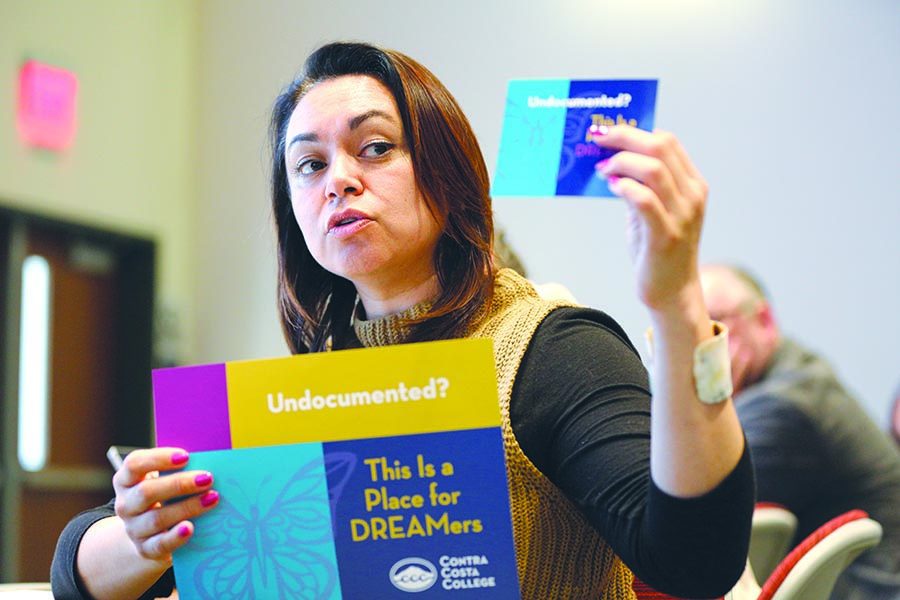Council delineates plan to safeguard sanctuary
Faculty prepares to resist federal orders, nips fear
HSI STEM Manager Mayra Padilla holds up signs in support of undocumented students during the College Council Meeting in GE-225 on Thursday.
Mar 14, 2017
The college and district’s stance on sanctuary status was discussed by the Contra Costa College’s College Council, a committee made up of classified staff, faculty, management and students in GE-225 on Thursday.
President Mojdeh Mehdizadeh said, “We are very clear about reaffirming our support for these populations.”
The uncertainty of President Donald Trump’s executive orders has left marginalized communities in a panic and wondering what will come next.
Calming the fears and worries of undocumented students and other marginalized communities has been a priority of the Contra Costa Community College District since the passing of sanctuary status in January.
During the College Council meeting, Mehdizadeh introduced an “activity form” document, created to examine the needs of undocumented students and employees, how they will be met and how to acquire resources.
“We are indicating this is what we believe. How do we show we can actually abide by what we are articulating in our resolution?” Mehdizadeh said.
Mehdizadeh said the pad-hoc committee, a committee created over winter break to draft the sanctuary resolution, went through each of the “be it resolved” parts of the sanctuary resolution to determine what steps to take next.
Mehdizadeh said district Chancellor Fred Wood wants to ensure the ad-hoc committee continues to help serve and guide the district’s three colleges, potentially at the district level.
During the March 2 meeting, the ad-hoc committee, Dr. Wood, the three college presidents, Executive Vice Chancellor Gene Huff, CCC HSI STEM Manager Mayra Padilla and Carney came up with a “forum of resolution 1-S” form.
The form states, “4CD police (Police Services) will not detain, question or arrest any individual solely on the basis of undocumented immigration status, whether actual or suspected.”
Mehdizadeh said the police department is drafting its procedure, which will articulate what the district police will do in the event of questions around immigration status.
“I think we are really lucky that our police force really represent our thought process for how we really value our students and our employees. We will see much more well articulated documentation from them,” she said.
The January resolution already protects Contra Costa, Los Medanos and Diablo Valley College students and employees’ from Immigration and Customs Enforcement (ICE) while giving them the chance to feel at ease while on campus.
Mehdizadeh said the ad-hoc committee is working on creating ways to share information to CCC’s community and the other campuses.
She said one of the things the ad-hoc committee recommended for anyone, if confronted with ICE agents, is to not to provide any information about a student or employee.
“Should anything occur, we do not provide any level of assistance or response. We immediately ensure that the chancellor’s office is aware and he (Wood) is going to provide specific guidelines,” Mehdizadeh said.
A concern for professors is not knowing what to do to protect their students in case ICE agents come to campus.
Ethics professor Asad Kabir asked, “What is our plan? What can we do?”
Mehdizadeh said, “If ICE comes knocking on this door, realistically I mean, we can say ‘we don’t want you in here.’ Legally I don’t think we can (stop them). They can barge in.
“I’m from Iran. I could go away. Realistically, that can happen,” she said.
Senior Executive Assistant Michael Peterson asked Mehdizadeh, “What happens if they (agents) have subpoenas?”
Mehdizadeh said there is a process on how to respond to subpoenas.
“You should give them nothing. You should not talk to ICE,” Mehdizadeh said.
Academic Senate Vice President Rick Ramos said, “I think it’s a really good idea to have the district policy.” He said telling an ICE agent there is a district policy in place to follow would ease the situation.
“If someone has a warrant signed by a judge, just get out of the way. Because what is going to happen is it’ll take you along with everyone else, but that is hard to do and judges are very sensitive to educational institutions right now,” Ramos said.
Padilla said having policies and procedures set for the college and district to follow in case of an ICE entry to the campuses would ensure everyone is prepared to stand up for students.
Padilla said an idea that came up during the district meeting on March 2 is creating a “know your rights” card for students and employees.
The card would give information for students on the front and for employees on the back, she said.



